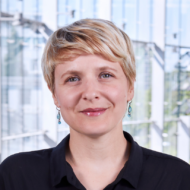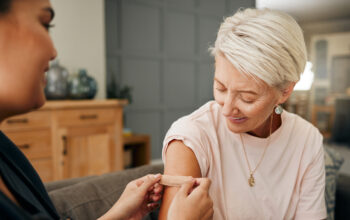How digital awareness campaigns can help build trust and confidence in COVID-19 vaccines and improve country readiness for vaccination
In December 2020, we witnessed a scientific feat that will go down in history books. This was just 10 months after the WHO declared COVID-19 a pandemic.
While many welcomed the news and saw it as the best way to protect themselves and others around them, we knew that, as with any new technology, we had work ahead of us to answer questions that people might naturally have about the vaccine development process.
Recognizing the need to address vaccine hesitancy, particularly in the online environment, we created a global digital media campaign. The #TeamVaccines campaign has encouraged positive engagement with scientific facts and personal stories, allowing people to make more informed decisions about the benefits of getting vaccinated and helping countries be ready to roll-out their vaccination programs.
The biopharmaceutical industry’s first global digital media campaign
Launched in early 2021 by IFPMA, #TeamVaccines is designed to build trust and confidence in COVID-19 vaccines by telling the human story behind the making of the COVID-19 vaccines through the voices of the biopharmaceutical industry’s employees. They share their personal stories – how they’ve had to deal with lockdown and loss, balancing children and home-schooling while also supporting family members and friends in unexpected ways – all while working to help advance science and urgently bring new vaccines to the world.
It is the industry’s first global digital media campaign, available in 8 languages and shared across Twitter, LinkedIn, YouTube and Facebook. We divided it into two phases.
Through expert advice and support from our scientific, vaccine and health literacy experts, extensive social media engagement of our network of companies and associations and our relationships with the wider scientific and healthcare community, global health advocates and patient groups, the campaign quickly reached key target audiences of healthcare professionals and industry influencers.
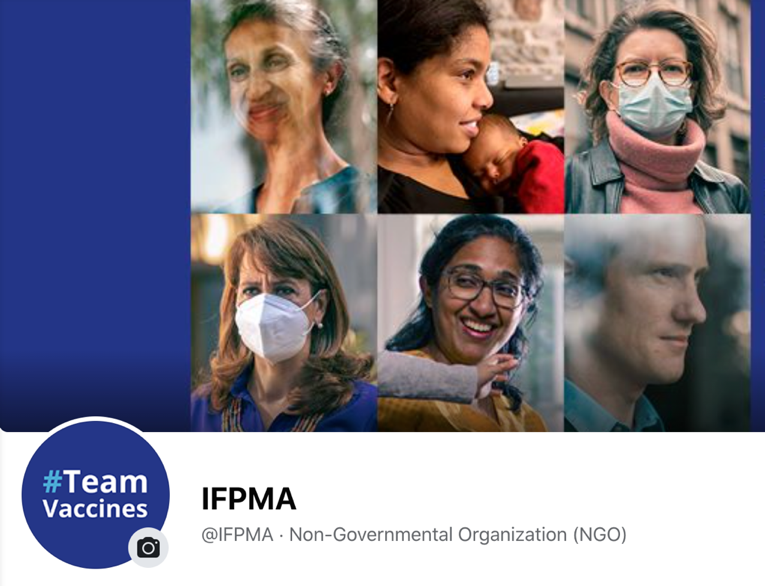
However, it was a game-changing partnership with Facebook that led the #TeamVaccines campaign to grow exponentially, reaching over 200 million people in 16 countries via Facebook’s social media platform.
Furthermore, thanks to Facebook brand lift studies conducted in 10 countries, we were able to learn more about what strategies can motivate change in attitudes and behavior among the vaccine hesitant and evaluate levels of positive attitudinal change in relation to COVID-19 vaccines safety and efficacy and social norms regarding getting vaccinated.
In this post, we are sharing our top 5 lessons learnt from the campaign.
#1 Lesson Learnt: Mix visual story-telling and facts to appeal to head and heart
The first phase of the #TeamVaccines campaign is engaging, empathetic, and touches social and personal emotions, while conveying facts about the vaccine development process. The campaign posts were linked to the campaign’s website with detailed employee stories and includes over 35 Q&As developed with our network of scientific, vaccine and health literacy experts around the world.
The brand lift studies revealed that people who saw #TeamVaccines posts on Facebook in the USA, Chile, Australia and Singapore were at least 2.5 percentage points* more likely to think that people would approve of getting a COVID-19 vaccine. Based on the population reached by the campaign, this means that an estimated 600,000 additional people expressed confidence in the social norm around the importance of getting vaccinated over that 3-week period.
Additionally, in the USA and Chile, people who saw the campaign were at least 2 percentage points* more likely to perceive the vaccines as both safe and important in preventing COVID-19. This means that over that 3-week period an estimated 300,000 additional people in the USA and Chile expressed confidence in both the vaccines safety and efficacy in preventing COVID-19.

#2 Lesson Learnt: Stay ahead of misinformation
Managing vaccine misinformation is a challenge on social media platforms, in particular on Twitter and Facebook who target a larger general public audience. For example, whereas on LinkedIn there was in general positive support and engagement from health and science industry employees, on Facebook more resources and time were required to limit the spread of false information and profanity messages particularly in certain vaccine-hesitant countries. A list of banned words in multiple languages was created and, although auto-moderation of comments by other users was often sufficient to create a balanced conversation, when necessary false or fake claims were manually removed and reported.
We evolved our messaging and launched #19ThingsToKnow in July 2021. The campaign features a series of 19 short messages that focus on real-life facts about COVID-19 vaccines and the positive impact of the global vaccine roll-out in saving lives, reducing hospitalizations and easing the burden on frontline healthcare workers.
People who saw selected messages from #19ThingsToKnow on Facebook in the USA, India, Australia, Thailand, France and the Philippines were at least 1.1 percentage points* more likely to perceive the vaccines as safe. Based on the population reached by the campaign over a 3-week period, this means an estimated 450,000 additional people expressed confidence on COVID-19 vaccines’ safety.

#3 Lesson Learnt: Use data to inform messaging and adapt to changing levels of vaccination, vaccine hesitancy and vaccine availability
Through regular campaign monitoring, feedback from our network of vaccine and scientific experts around the world and the use of data tools like Facebook’s COVID-19 Trends and Impact Survey developed with the universities of Carnegie Mellon and Maryland and used by John Hopkins Center for Communication Programs, we adapted and selected our messaging to ensure we evolved with the changing COVID-19 landscape in different countries.
People who saw #19ThingsToKnow on Facebook in the USA, India, Mexico, Australia and the Philippines were at least 1.1 percentage points* more likely to report that COVID-19 vaccines are important in preventing COVID-19. Based on the population reached by the campaign, that means an estimated 470,000 additional people expressed confidence in COVID-19 vaccines’ efficacy over a 3-week period.

#4 Lesson Learnt: Use diverse, local language and culturally appropriate messaging
The first phase of #TeamVaccines did not resonate with people who saw the campaign in the Philippines and we believe this was largely due to the fact that viewers did not identify with the scientists in the videos and the subtitles were in English. Conversely, people in the Philippines who saw #19ThingsToKnow, which uses words rather than people and the video messages are significantly shorter and simpler to understand, were 1.7 percentage points* more likely to perceive the vaccines as both safe and important in preventing COVID-19. Based on the population reached over 3 weeks, this means an estimated 130,000 additional people expressed confidence in both COVID-19 vaccines’ safety and efficacy in the Philippines because of #19ThingsToKnow.
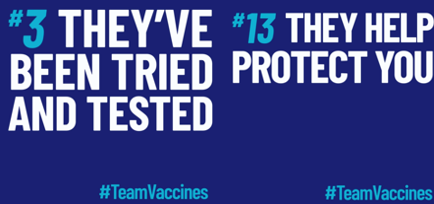
In India, all the social posts were translated into Hindi to reach a broader and more rural audience. People in India who saw #19ThingsToKnow were 2.6 percentage points* more likely to express confidence in the social norm around the importance of getting vaccinated. Based on the population reached over 3 weeks, this means an estimated 310,000 additional people in India were more likely to express confidence in the social norm around the importance of getting vaccinated.

#5 Lesson Learnt: The key role of women as vaccination influencers
Our pre-campaign research indicated that in general women are more vaccine hesitant than men and also represent a higher proportion of employees in the healthcare professional sector; healthcare professionals not only play an important role in influencing vaccination decisions but are themselves a high-risk COVID-19 group. Furthermore, women in the 40-65 year age category are more likely to be “double carers” for elderly parents and younger children/young adults, therefore representing an important voice in household decisions about healthcare.
We observed that in Australia women aged 35-54 years old, in Singapore women aged 18-34 years old, and in the USA women aged 18-24 years old who saw #TeamVaccines on Facebook were at least 4.4 percentage points* more likely to express confidence in the social norm around the importance of getting vaccinated.
We also observed that although neither campaign had a significant impact in Japan or France (both traditionally vaccine-hesitant countries), women aged 35-44 years old were at least 2.2 percentage points* more likely to express confidence in the social norm around the importance of getting vaccinated after seeing the #19ThingsToKnow messages.
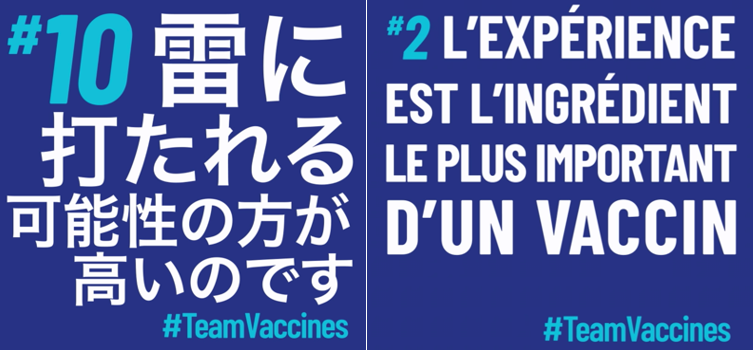
Moving Forward
Building on what we have learned and the power of digital awareness campaigns to drive positive social change and behavior and by consequence improve country readiness for vaccination, in 2022 #TeamVaccines aims to continue to build confidence and trust in COVID-19 vaccines and the value of vaccines in general to our society, healthcare systems and individual well-being.
The biopharmaceutical industry continues to research new vaccines, explore new administration techniques, adjust scientific approaches, work on vaccine boosters, and find new and innovative ways of producing vaccines safely and quickly. The need for reliable and accurate information will continue to grow. Through continued industry collaboration and teamwork and unique collaborations with our partners, we believe we can show how science and innovation can help make the world a healthier and safer place for everyone.
Authors



